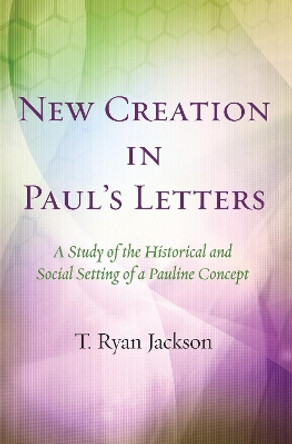Description
Paul, Politics, and New Creation: Reconsidering Paul and Empire nuances Paul's relationship with the Roman Empire. Using rhetorical, sociohistorical, and theological methods, Najeeb T. Haddad reevaluates claims of Paul's anti-imperialism by situating him in his proper Hellenistic Jewish and Greco-Roman contexts.
About the Author
Najeeb T. Haddad is assistant professor and chair of the Department of Religious Studies at Notre Dame of Maryland University.
Reviews
Najeeb T. Haddad offers a critique of the anti-imperial reading of the apostle Paul that all proponents of this approach will have to take into account. In particular, he is to be commended for bringing new sources and categories to the table. His focus on figured speech in relation to "hidden transcripts" adds a valuable emic perspective and will no doubt be extremely stimulating for future debates.
-- Christoph Heilig, University of BaselIn this monograph that pursues an argument with close attention to Paul's letters, Najeeb T. Haddad gives us a nuanced understanding of the relationship Paul sees between the church and the cosmos, which includes the Roman Empire. Haddad offers a carefully argued challenge to the popular portrait of the counter-imperial Paul. Paul, Politics, and New Creation is therefore a must-read for all students of Paul's letters and those studying first century Christianity.
-- Mark Reasoner, Marian UniversityOn the basis of extensive research and careful analysis, Najeeb T. Haddad presents a much-needed assessment of the "Paul and Empire" trend in Pauline studies today. Using rhetorical, sociopolitical, and theological readings of Paul's letters, he argues for a more nuanced understanding of Paul's relation to civic authority in the first century. In assessing this relation, Haddad shows the need for increased attention to Paul's eschatological and soteriological perspectives. The result is a significant contribution to Paul and Empire studies.
-- Mark J. Goodwin, University of DallasHaddad provides a great service to the New Testament Guild by pointing out that the alleged hidden transcripts and coded speech in Paul's letters supposedly subverting the Roman Empire lack any of the markers for such figured speech that are prescribed by ancient rhetoricians. Haddad demonstrates that rather than engaging in clandestine political subversion to undermine the empire, Paul viewed the imperial authority as divinely ordained but belonging to this present age, which is perishing. Haddad then convincingly shows that Paul viewed the empire not in need of subversion but in need of conversion to the inclusive gospel of Jesus Christ. He thus liberates Paul's thought and ministry from the confines of a politician to the all-inclusive hopes and dreams of a preacher and theologian inviting and welcoming all, including the empire, into a new creation in Christ. This book is a most significant contribution to Pauline theology and should be read not only by everyone interested in Paul and politics but also by every student and interpreter of Paul.
-- Troy W. Martin, Saint Xavier UniversityHaddad presents a satisfying account of how Paul's theological vision works within the Roman imperial context, and his criticisms of a counterimperial interpretation of Paul, especially that having to do with how figured speech functioned in ancient rhetoric, must be taken seriously.... [A] substantive contribution to this ongoing discussion.
* Catholic Biblical Quarterly *Haddad's volume makes an important contribution to Pauline studies and would make a fine textbook for a course on Paul, or on politics and the Bible. Any scholar interested in this topic will have to contend with Haddad's volume, which is erudite, and yet any graduate student would find the book sufficiently engaging and accessible.
* Journal of Moral Theology *Book Information
ISBN 9781978708969
Author Najeeb T. Haddad
Format Paperback
Page Count 246
Imprint Lexington Books/Fortress Academic
Publisher Rowman & Littlefield
Weight(grams) 345g
Dimensions(mm) 229mm * 152mm * 17mm







